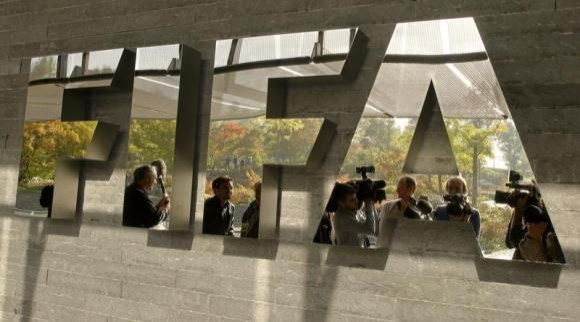World Cup 2022: FIFA Clears Qatar Prompting More Calls For Transparency

In a report seeking to bolster transparency in FIFA, global soccer’s governing body appears even more entrenched in a culture of secrecy. Controversy surrounding the bidding over the 2018 and 2022 World Cup competitions may have reached its pinnacle; the latest developments involve information from a two-year investigation contained in a 430-page report -- condensed to just 42 pages that absolved host nations Russia and Qatar of any ethics violations.
Chief investigator Michael J. Garcia and chief judge Hans-Joachim Eckert are sparring over the investigation’s contents that were announced on Thursday. Garcia blasted Eckert's report, claiming it "contains numerous materially incomplete and erroneous representations of the facts and conclusions detailed" in Garcia's own report.
Finding defenders of Eckert’s summary has proven difficult. His report contains roughly four pages devoted to Qatar’s successful 2022 bid, with revelations that present possible conflicts of interest but are ultimately dismissed. Six of the seven sections in the report addressed contentious topics such as a “Consultants and Advisors Affiliated with the Bid” and “Role and Relevance of Whistleblower.” A key word in the report, though, was “however,” which was used 10 times, preceding the rejection of an aforementioned charge.
The report referred to how “two individuals who acted as consultants or advisors to the Qatar 2022 bid raised concerns in the light of relevant FIFA Ethics rules.” Since the two individuals did not hold official soccer positions, they were not bound to FIFA Ethics rules, and therefore binding them to the rules “poses certain legal challenges.”
On Nov. 17, 2010, just weeks before the Dec. 2, 2010 vote that awarded Qatar the 2022 World Cup, Argentina faced Brazil in a friendly match in Doha, the capital of Qatar. The report raised concerns about payments to the Argentina Football Association, but it concluded by noting that the wealthy individual who financed the match was not affiliated with Qatar 2022.
On Jan. 26, 2010, Qatar 2022 controversially sponsored the CAF Congress in Angola. According to Eckert’s report, “The sponsorship agreement granted Qatar 2022 exclusive rights to market its bid during the event. For this privilege, the bid team paid CAF approximately USD 1.8 million.” The report stated that sponsoring such an event was within the rules and didn’t “affect the integrity” of the bidding process. The report did note that the Investigatory Chamber of the FIFA Ethics Committee had a “negative impression” of the “unclear” cost of the event.
Perhaps the most noteworthy section was an almost two-page dossier on payments to former FIFA executive committee member Mohamed Bin Hammam, who was banned for life in July 2011 for bribery. The report said the relationship between Qatar 2022 and Bin Hammam was “somewhat distant” and his improper payments to CAF officials were for his own candidacy for FIFA president. Bin Hammam’s payment of legal costs to Reynald Temarii, the former OFC president, was also dismissed as having “no direct link between Qatar 2022 and any payments of Mr. Bin Hammam to Mr. Temarii.” Yet the report refers to how Temarii “influenced the voting process by eliminating votes for Australia and England.”
The final rebuke was over the credibility of the whistleblower. “Voluminous records and other materials” with allegations of corruption since December 2012 were discredited. The report cited “serious concerns about the individual’s credibility were apparent from the outset” and the individual’s journals “could not be relied upon to corroborate its story” with “altered evidence” to support allegations.
Experts were quick to sound off on a report that confined its sole scathing arguments to England’s attempts to woo former executive member Jack Warner.
“My initial reaction was resignation as no one really expected Russia or Qatar to be stripped of the World Cup, but it was nevertheless startling to see how badly the whole effort has gone,” said Alexandra Wragge, the president of TRACE, an anti-bribery and good governance organization, in an email. “In an attempt to restore confidence in its governance, FIFA paid for a year-long report based on a multi-country investigation. We’re now getting just a summary of that secret report, and the lead investigator calls it inaccurate. FIFA’s commitment to transparency is more in question now than when this process began.”
“In spite of Mr. Garcia stating that information was omitted or misrepresented and in spite of Judge Eckert listing all of the obstacles to the investigation, the report still includes a long list of misconduct: vote trading, concealed relationships, inappropriate demands by a member of the [executive committee, etc]. If this edited summary contains these fairly egregious findings, it would be good for the public to know more about what Mr. Garcia’s report contains.”
In October, Sen. Bob Casey, a Democrat from Pennsylvania, demanded more transparency from FIFA.
"I urge FIFA to make public Mr. Garcia's entire investigative report and that any wrongdoing be swiftly addressed, especially if there is evidence that the vote for the 2022 World Cup was tainted and disadvantaged the U.S. bid," Casey wrote on his official site.
There was no public statement from FIFA President Sepp Blatter, though he previously voiced reservations about a Gulf coast nation with a population of about 2.2 million with about the size of Connecticut, and with summer temperatures possibly reaching 120 degrees Fahrenheit, hosting a World Cup.
In an interview with Swiss Television station RTS in May, Blatter said he regretted that Qatar was awarded the 2022 World Cup.
“Of course, it was a mistake. You know, one comes across a lot of mistakes in life,” said Blatter.
“The Qatar technical report indicated clearly that it is too hot in summer, but the executive committee with quite a big majority decided all the same that the tournament would be in Qatar.”
© Copyright IBTimes 2025. All rights reserved.






















